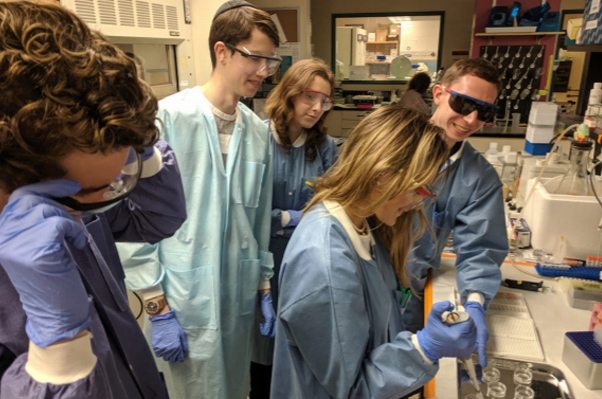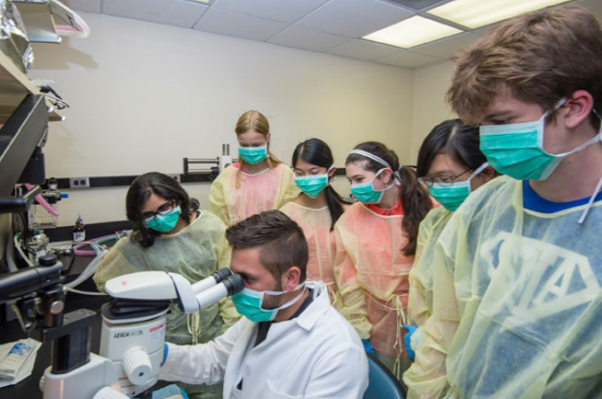Graduate Student Experiences
Originally appeared in The Hillock Newsletter, produced by the Department of Neurobiology and Anatomy.

"I have been doing live-cell microscopy demonstrations for the Neuroscience Summer Camp high school students for a few years now, and this past year I was also able to give a short lecture on neuronal growth. It's nice to be able to interact with younger students and give them a glimpse of how neuroscience research is conducted. The students always have really insightful questions on the basic science of what I'm showing them. Whether it's fluorescent mitochondria or EB3 comets, they want to know more about the hows, whats and whys. Not only are these discussions fun, but they also help me stay up-to-date with the science, and practice my ability to communicate effectively to different audiences."
– Ankita Patil, Baas Lab
"After hearing about NeuroCamp for a few years from some other fellow students, I decided to get involved. This past year I was a part of the research component and was able to work with two high school students. I initially thought it was going to be difficult to convince a group of high school students that bladder function following SCI is a "cool and fun" topic because let's be real, what 17-18 year old is going to hear the word "urine" and get excited about that? To my surprise, two brave souls decided to work with me and the experience couldn't have been better. Since I only had two students I was able to let them learn the whole process of immunohistochemistry, explain in detail why urinary dysfunction after SCI is so important to patients in the clinic, and what we are trying to accomplish in our lab. I was really proud of my students as they presented the work they completed in the lab and handled questions from faculty members so well. NeuroCamp as a whole was not only an invaluable learning experience for me and my students, but was also a lot of fun. Needless to say, I look forward to participating in the High-School Summer Camp again next year!"
– Jaki DeFinis, Hou Lab
"I demonstrated electrophysiology and optogenetics research, which included electrode/optic fiber assembly and in vivo recording in freely behaving mice. I also explained why this information is meaningful with a preview of data analysis at both the single-neuron and local field potential levels. The students were especially amazed by the tiny size of the electrode wire, about the thickness of a single hair strand, and how hard it was to see without a microscope. It was great to expose high school students to advanced neuroscience techniques because many students do not hear about these until undergraduate studies or later."
– Ashley Opalka, Wang Lab

"The NeuroCamp is a great experience for not just the high school participants, but also us as students, scholars and educators. Personally, it has helped me to step back and put our research into a greater perspective and has allowed me to communicate with individuals who aren't versed in 'our' vocabulary, which I think is crucial to our training. All the while, I think the most rewarding part about the program is seeing the students' excitement about being in the lab and being able to participate in research."
– Lyandysha Zholudeva, PhD, Lane Lab
"I was one of the project coordinators this past summer in the neuroscience summer camp for high school students interested in a biomedical career. I led a project teaching the students about stem cell biology, neuronal differentiation, cerebral organoids, immunocytochemistry, microscopy, and Gulf War illness. I really enjoyed showing the students around the lab and all the cool things we do as graduate students. It was so rewarding at the end of the week to watch how much the students learned in such a short time and how well they presented their work to the department. These visits are incredibly valuable because they provide the students with a hands-on opportunity to see what it is really like to work in a lab and pursue a career in biomedical science."
– Philip Yates, Baas Lab
"This summer was my third year being involved in the Neuro Camp program! I led a lecture on sensation and perception where we used different interactive activities to help them connect the lecture topics for each of the sensations. The lab also did a demo on sham spinal cord injuries and I led a group through their group project on using anatomical tracers to visualize neuronal circuitry. I think the students' favorite experience in the lab was getting to see a pseudorabies virus (PRV) tracing surgery and having the opportunity to practice their 'surgery skills' by suturing oranges. I think the most rewarding point for me was seeing some of the students get more interested in science where a few of them even asked to come back to the lab next year!"
– Margo Randleman, Lane Lab
Back to Top